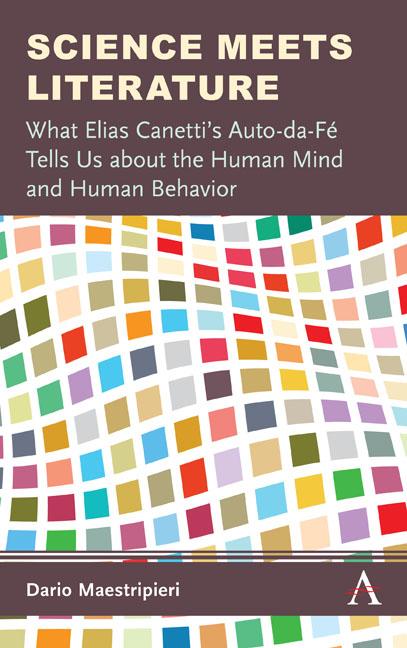 Science Meets Literature
Science Meets Literature Book contents
- Frontmatter
- Contents
- Preface
- Acknowledgments
- Chapter One Why Science and Literature?
- Chapter Two Elias Canetti: A Visionary Literary Genius on a Quest to Understand Human Nature
- Chapter Three The Plot of Auto-da-Fé
- Chapter Four Auto-da-Fé Is a Novel about Human Nature
- Chapter Five Major Themes Running Through Auto-da-Fé
- Chapter Six Analysis of Part I: A Head Without a World
- Chapter Seven Analysis of Part II: Headless World
- Chapter Eight Analysis of Part III: The World in the Head
- Chapter Nine Narrative Strategies in Auto-da-Fé
- Chapter Ten Consilience, the Canetti Way
- Elias Canetti: Chronology
- References
- Index
Chapter Four - Auto-da-Fé Is a Novel about Human Nature
Published online by Cambridge University Press: 06 July 2019
- Frontmatter
- Contents
- Preface
- Acknowledgments
- Chapter One Why Science and Literature?
- Chapter Two Elias Canetti: A Visionary Literary Genius on a Quest to Understand Human Nature
- Chapter Three The Plot of Auto-da-Fé
- Chapter Four Auto-da-Fé Is a Novel about Human Nature
- Chapter Five Major Themes Running Through Auto-da-Fé
- Chapter Six Analysis of Part I: A Head Without a World
- Chapter Seven Analysis of Part II: Headless World
- Chapter Eight Analysis of Part III: The World in the Head
- Chapter Nine Narrative Strategies in Auto-da-Fé
- Chapter Ten Consilience, the Canetti Way
- Elias Canetti: Chronology
- References
- Index
Summary
What Is Auto-da-Fé All About?
The greater superficial knowledge one has of them, the more one will inevitably misunderstand the intentions of Elias Canetti's important novel Auto-da-Fé. (Ernst Waldinger 1987, p. 299)
A central question that is inevitably raised by any readings and discussion of Auto-da-Fé, whether these involve laypeople or literary scholars is, What is the novel really about? Why did Canetti write Auto-da-Fé? What was he trying to accomplish with it? Virtually every essay written about Auto-da-Fé— and a rich body of literature about Auto-da-Fé has grown since Canetti was awarded the Nobel prize for Literature in 1981— has provided different answers to these questions.
This is not entirely surprising, however. Auto-da-Fé is a complex literary text, with a multilayered structure and content, written by an extremely intelligent, erudite, and sophisticated intellectual who had an ambitious agenda but never made it explicit. As is the case of other similarly complex and ambitious works of art, Auto-da-Fé can be read, analyzed, and interpreted at many different levels. As remarked by an early reviewer, Auto-da-Fé “is of such richness that all sorts of commentaries come to mind uninvited and en masse” (Brion 1987, p. 308). Different readers get something different out of the novel, depending on their age or gender, their social and cultural background, their field of expertise and education, their knowledge, their sensitivity, their literary taste, their political or ideological orientation, and also the particular time of their life in which they read the novel, the reasons they read it, and their expectations. David Darby, a literary scholar who has written extensively about Canetti, remarked that Auto-da-Fé is an excellent example of an “open text,” a concept developed by Umberto Eco to describe a literary text in which the author expects the reader to contribute significantly to the interpretation of the text and for which different interpretations are expected from different readers. Accordingly, literary scholars typically bring their own perspective to the interpretation of Auto-da-Fé – Marxist, feminist, or aesthetic— and their essays appear to be mainly aimed at criticizing each other. Auto-da-Fé inevitably elicits strong visceral reactions.
- Type
- Chapter
- Information
- Science Meets LiteratureWhat Elias Canetti's Auto-da-Fé Tells Us about the Human Mind and Human Behavior, pp. 51 - 74Publisher: Anthem PressPrint publication year: 2019


